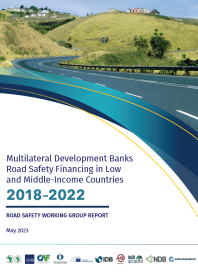
Multilateral Development Banks Committed $3.6 Billion for Road Safety in Developing Countries over 5-year period
May 25, 2023
More support needed from governments and donors to reach UN Goals
LEIPZIG, May 23, 2023 – The Multilateral Development Banks (MDBs) Road Safety Working Group announced today, at a meeting in Leipzig, Germany, that seven of its members committed $3.6 billion toward road safety initiatives in developing countries during the period 2018-2022. Three standalone road safety projects—in Bangladesh (World Bank), India[1] (Asian Development Bank and World Bank), and Romania (European Investment Bank)—totaled $912 million in MDBs financing, which is more than one-quarter of the amount approved by seven of the working group members during this timeframe.
These commitments come in response to a global health crisis that kills 1.35 million people on the world’s roads every year. Ninety-three percent of these fatalities occur in developing countries.
Despite these sizable contributions, more is needed to achieve the United Nations’ goal of halving road fatalities in low- and middle-income countries by 2030. As motorization rates increase across the developing world, already-high fatality rates are likely to escalate. A minimum of $200 billion in additional financing is needed to improve road safety measures and meet the UN goal. Closing the financing gap will be challenging and scaling up the contributions by governments and MDBs will require a commensurate increase in grant funding to support their country engagement process and catalyze action.
"There is an urgent need to increase road safety financing in LMICs, and MDBs are already playing a vital leadership role in helping to achieve this,” said Nicolas Peltier-Thiberge, Global Director for Transport at the World Bank. “Increased donor support will be crucial in strengthening the MDBs engagement with country counterparts and accelerating the implementation of larger and more effective road safety projects and programs.”
The MDB Road Safety Working Group, established in 2009, is comprised of 10 member institutions[2] that are uniquely positioned to support LMICs in reaching their considerable and challenging road safety financing needs. MDBs are already major financiers of transport projects in low- and middle-income countries and approved a total of US$50 billion in road and urban mobility financing from 2018-2022, averaging around US$10 billion per year. This high level of lending by the MDBs road and urban mobility sectors is set to expand and provides a significant opportunity to advance road safety financing.
"Road safety is underfunded in most LMICs. As we approach the middle of the second UN Decade of Action, we need to boost financing and coordinate our efforts to drive down the rate of road crash fatalities and injuries, many of which are preventable. The MDBs Working Group will continue to emphasize the importance of this issue and set the course for future collective actions,” said Ana María Pinto, Transport Division Chief at the Inter-American Development Bank.
MDBs engagement with governments and their agencies is the invisible but necessary ingredient in supporting LMICs to substantially increase their road safety financing. Ready access to grants that can catalyse road safety investment projects creates strong incentives for LMICs to engage more deeply with MDBs. It amplifies and sustains the process and ultimately its financing outcomes. For this reason, increased donor support for MDBs engagement with their country counterparts will be crucial to future success.
The Global Road Safety Facility (GRSF)—a multi-donor trust fund hosted by the World Bank—is well-positioned to support the efforts of MDBs to boost road safety financing. It provides funding, expertise, and technical assistance to MDBs and governments in LMICs. Between 2011–2020, GRSF disbursed US$74 million, which catalyzed US$2.35 billion of road safety financing under the World Bank’s transport sector lending program. The GRSF is in the process of beginning a new phase, in which it aims to significantly increase road safety financing over the coming decade.
The working group members called on governments and the private sector to ramp up funding in line with the UN 2030 goal of halving road crash death and injury. Group members called specifically for additional support for GRSF and a boost of its donor contributions. In addition, the working group committed to reviewing road safety performance in low-income countries; promoting lessons being learned from the implementation of large stand-alone projects; enhancing procedures for tracking MDB road safety financing in LMICs; and sustaining ongoing efforts to harmonize road safety policies and practices across the MDBs.
For more information, refer to the full report: Multilateral Development Banks Road Safety Financing in Low and Middle-Income Countries: 2018–2022
MDB Road Safety Working Group members:
African Development Bank, Asian Development Bank, Asian Infrastructure Investment Bank, Development Bank of Latin America, European Bank for Reconstruction and Development, European Investment Bank, Inter-American Development Bank, Islamic Development Bank, New Development Bank, and World Bank.
---
Contacts
Benjamin Holzman
GRSF Media Relations
bholzman@worldbank.org
[1] The India State Support Program supported by the Asian Development Bank and the World Bank is awaiting approval by the Government of India.
[2] African Development Bank, Asian Development Bank, Asian Infrastructure Investment Bank, Development Bank of Latin America, European Bank for Reconstruction and Development, European Investment Bank, Inter-American Development Bank, Islamic Development Bank, New Development Bank, and World Bank.

